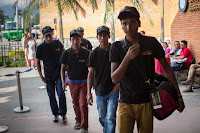After many years of focusing on pro-poor and targeted approach of fighting poverty, since 2004 Indonesia is shifting its SP system towards universalism of social protection. The umbrella law number 40/2004 on SJSN (Indonesian National Social Security System) was adopted to provide five benefits programmes : Universal Health care, Accident at work insurance, Old age insurance, life insurance and pension fund.
After joint pressure from the trade Unions, in 2014, 10 years after its adoption, the government started to implement the Universal health care in 2014, and other labor related programmes and pension fund in 2015. The management of SJSN will be under two non-for-profit social security administrating bodies for Universal health care (BPJS health) and other Labor related programmes (BPJS Labor). It is monitored by a national board of social security (DJSN), also responsible to formulate general policies of the system. All these three bodies include representatives from government, employers, trade unions and academic/experts.
Sustainable Development Goals 1.3 focuses on implementing nationally appropriate social protection systems and measure for all, including floors, and by 2030 achieve substantial coverage of the poor and vulnerable. In 2016, the World Bank, the ILO and world leaders launched the Global Partnership for Universal Social Protection (GP-USP 2030) aimed to help countries to reach SDG 1.3. The Global Partnership created an interim steering committee composed out of two representatives from high-income countries, two representatives from Middle-income countries (Indonesia and Mexico) and two from representatives of Low-income countries.
Prior to the ILO Global Social Protection Week, 25-28 November 2019, Indonesia partners KSBSI with WSM took the initiative to organize a national forum on Social protection, on 6th of November 2019 in Jakarta. The key resource speakers and their topics: Mr. Maliki (Interim Steering Committee in the GP-USP2030) on Indonesia Roadmap for USP, Mr. Rekson Silaban (KSBSI/ workers’ reps in BPJS) on CSO/TU Agenda setting on SP, Mr. Subiyanto (KSPSI/ workers’ reps in DJSN) on 15 years of SP and Mr. Irham Saifuddin (ILO Jakarta) on SP Floor.
Also attending were all trade union confederations; KSBSI, KSPSI, KSPI, migrant workers organizations; SBMI and JBM, Wage Indicators, Japbusi-Plantation workers alliance, and many national federations, from garment sector to informal workers.
The forum agreed on a common national agenda:
After joint pressure from the trade Unions, in 2014, 10 years after its adoption, the government started to implement the Universal health care in 2014, and other labor related programmes and pension fund in 2015. The management of SJSN will be under two non-for-profit social security administrating bodies for Universal health care (BPJS health) and other Labor related programmes (BPJS Labor). It is monitored by a national board of social security (DJSN), also responsible to formulate general policies of the system. All these three bodies include representatives from government, employers, trade unions and academic/experts.
Sustainable Development Goals 1.3 focuses on implementing nationally appropriate social protection systems and measure for all, including floors, and by 2030 achieve substantial coverage of the poor and vulnerable. In 2016, the World Bank, the ILO and world leaders launched the Global Partnership for Universal Social Protection (GP-USP 2030) aimed to help countries to reach SDG 1.3. The Global Partnership created an interim steering committee composed out of two representatives from high-income countries, two representatives from Middle-income countries (Indonesia and Mexico) and two from representatives of Low-income countries.
Prior to the ILO Global Social Protection Week, 25-28 November 2019, Indonesia partners KSBSI with WSM took the initiative to organize a national forum on Social protection, on 6th of November 2019 in Jakarta. The key resource speakers and their topics: Mr. Maliki (Interim Steering Committee in the GP-USP2030) on Indonesia Roadmap for USP, Mr. Rekson Silaban (KSBSI/ workers’ reps in BPJS) on CSO/TU Agenda setting on SP, Mr. Subiyanto (KSPSI/ workers’ reps in DJSN) on 15 years of SP and Mr. Irham Saifuddin (ILO Jakarta) on SP Floor.
Also attending were all trade union confederations; KSBSI, KSPSI, KSPI, migrant workers organizations; SBMI and JBM, Wage Indicators, Japbusi-Plantation workers alliance, and many national federations, from garment sector to informal workers.
The forum agreed on a common national agenda:
- Harmonization of laws and regulation on SP; Revision of Law nr. 40/2004 and other regulations;
- Expansion of coverage on ‘missing middle’, informal workers, migrant workers, domestic workers, workers in plantation sector, and workers in a micro-small enterprises (who can’t afford a whole package of social security);
- Unemployment Insurance: insurance for workers whose job are terminated or as an impact of Industrial revolution 4.0 by providing re-skilling, up-skilling and vocational training;
- Increasing benefits for workers on accident and life insurance and housing for workers.














